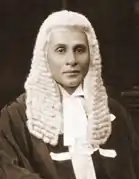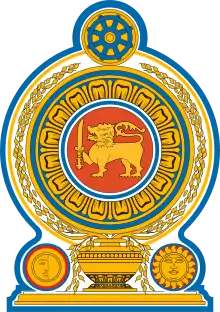Alexander Francis Molamure
Sir Alexander Francis Molamure, KBE (7 February 1888 – 25 January 1951) (commonly known as Sir Francis Molamure or A. F. Molamure) was a Ceylonese politician. He became the first speaker of both the State Council of Ceylon and Parliament of Ceylon. He was a controversial figure due to his resignation from the State Council and for organising the Panamure Elephant Kraal in 1950.
Sir Alexander Francis Molamure KBE | |
|---|---|
 | |
| 1st Speaker of the State Council | |
| In office 7 July 1931 – 10 December 1934 | |
| Succeeded by | Forester Augustus Obeysekera |
| 1st Speaker of the Parliament of Ceylon | |
| In office 14 October 1947[1] – 25 January 1951 | |
| Prime Minister | D. S. Senanayake |
| Preceded by | Waithilingam Duraiswamy |
| Succeeded by | Albert Peries |
| Member of the Sri Lanka Parliament for Balangoda | |
| In office 14 October 1947[1] – 25 January 1951 | |
| Preceded by | Constituency created |
| Succeeded by | Jayaweera Kuruppu |
| Personal details | |
| Born | 2 July 1888 |
| Died | 25 February 1951 (aged 62) |
| Nationality | Ceylonese (Sri Lankan) |
| Political party | United National Party |
| Spouse(s) | Adeline Meedeniya |
| Children | Seetha Molamure |
| Alma mater | S. Thomas' College |
| Profession | Advocate |
| Awards | Knight Commander of the Most Excellent Order of the British Empire |
Early life
Born in Ratnapura on 2 July 1888, he was educated at S. Thomas' College, Mount Lavinia, and played for his school cricket team.[2] He qualified as an Advocate.
Political career
Molamure was elected to the Legislative Council of Ceylon from the Kegalle District in 1924. He was a member of the committee on higher education that was appointed by the Governor which recommended the formation of the University of Ceylon. [3] In 1927, he chaired the 9th AGM of the All Ceylon Buddhist Association Congress.
In 1931, he was reelected to the First State Council from the Dedigama electorate. The State Council was ceremonially opened on 10 July 1931, and Molamure was elected as the speaker three days earlier on 7 July having defeated Sir Stewart Schneider by 35 to 18 votes. However, he lost the post and seat 10 December 1934 after an absence of three months without leave following conviction in the misappropriation of funds while functioning as a trustee.[4][5]
After brief absence from politics he was elected to the State Council in 1943 from Balangoda in by-election. He was a prominent member of the Ceylon National Congress. In 1947, he was reelected from Balangoda as a Member of the newly formed Parliament of Ceylon. At the first seating of parliament of the newly independent Ceylon, Molamure's name was proposed as speaker by C. Sittampalam and S. U. Edirimanasingham when the opposition proposed Herbert Sri Nissanka. In the following vote Molamure gained 58 and Sri Nissanka gained 41.[5][6] Thereby Molamure became the first speaker of parliament. He held the post of speaker until his death in 1950 before his term of office ended.
He was appointed a Knight Commander of the Most Excellent Order of the British Empire by George VI in 1949 and was known as Sir Francis Molamure.[7]
Elephant Kraal
Molamure was the nephew of the Maduwanwela Maha Disawe and was named one of the trustees of the trust his uncle left to his daughter and Molamure's cousin, Dingiri Appey. The trust included the Maduwanwela Walawwa, 83,000 acres of timber and gem lands and a vast fortune of gems, jewellery and properties. Upon his uncle's death, Molamure and another trustee, Cyril Dangamuwa were able to successfully manipulate the trust left for Dingiri Appey, who was crippled at birth, to their benefit. The wealth from this Maduwanwela trust provided Molamure with the resources to launch an ambitious political career. As his uncle, the Maduwanwela Maha Disawe before him, Molamure continued to organise the Elephant Kraal in Panamure, which had been started by the Maduwanwela Maha Disawe in the late 1800s. Sir Francis was the chief organiser of the last Elephant Kraal at Panamure in 1950, which led to much controversy following the killing of the bull elephant who tried to break the Kraal blockade. The incident lead to much public outcry and debates in parliament resulting in the ban on Elephant Kraals and capture of wild elephants.[8][9]
Marriage and family
Molamure married Adeline Meedeniya, who became the first female member of the State Council. She was the daughter of J. H. Meedeniya Adigar, member of the Legislative Council.[10][11]
Their only daughter, Seetha Molamure, became a member of the Senate of Ceylon. She married to L. J. Seneviratne a civil servant who became the Secretary of the Treasury.[12]
Death
Molamure suffered a stroke while presiding over parliament at the speakers seat and was taken to the General Hospital in an unconscious state. He died in hospital a day later on 25 January 1951.[6]
References
- "Speakers". parliament.lk. Parliament of Sri Lanka. Retrieved 17 May 2018.
- Manamendra, Gayathra (13 March 2009). "The Battle of the Blues Steeped in tradition". Daily News. Archived from the original on 16 March 2009. Retrieved 1 July 2009.
- 64th death anniversary of A. F. Molamure The Controversial Sir Francis: Speaker who collapsed while Presiding
- "Speakers". Archived from the original on 25 July 2009. Retrieved 1 July 2009.
- Rajasingham, K. T. (22 September 2001). "Sri Lanka: The Untold Story". Asia Times. Archived from the original on 24 June 2009. Retrieved 1 July 2009.
- "Molamure is elected Speaker of First Parliament". Sunday Times. 14 October 2007. Retrieved 1 July 2009.
- The Gazette
- The Last Kraal in Sri Lanka
- The Last Stand
- Abeynaike, H.B.W. (23 February 2009). "Press Magnate Who Fought For Country's Freedom". Daily Mirror. Retrieved 1 July 2009.
- Lady Members Archived 2010-11-26 at the Wayback Machine
- RAMBUKPOTHA SENEVIRAJA - Family #3117
